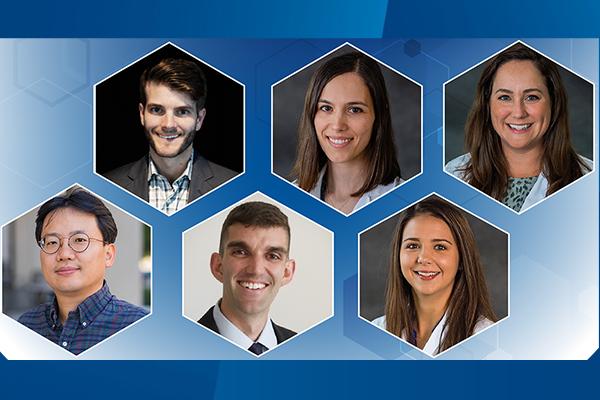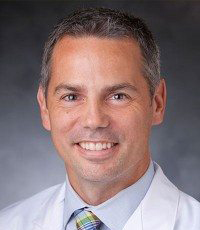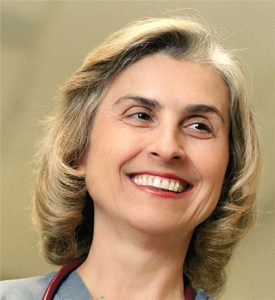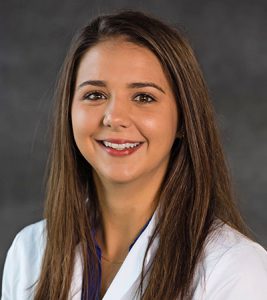
Members of Duke Anesthesiology gathered virtually for the first time on May 5 to share the results of their research pursuits and celebrate scientific excellence at its 28th Annual Academic Evening, an event that aims to advance anesthesia, critical care and pain management. The department’s junior-level investigators and faculty presented 81 poster abstracts this year, ranging from basic science, clinical trials and case reports.

 “Part of the magic of Academic Evening has always been the social nature of it – investigators from far-flung areas of the department getting together and sharing their ideas with each other. A couple of years ago I heard a story of a basic scientist finding an unlikely clinical collaborator for her project while standing at a cocktail table eating Thai chicken skewers,” says Dr. Jeffrey Gadsden, program co-director and chief of the department’s Orthopaedics, Plastics and Regional Anesthesiology Division. “These have been a challenging few months for all of us [given the COVID-19 crisis], and we knew that people would be focused on other things – performing their clinical jobs and staying healthy being at the top of that list. At the same time, we believed that our department would want to – and deserved to – celebrate our wonderful and diverse academic accomplishments with each other.”
“Part of the magic of Academic Evening has always been the social nature of it – investigators from far-flung areas of the department getting together and sharing their ideas with each other. A couple of years ago I heard a story of a basic scientist finding an unlikely clinical collaborator for her project while standing at a cocktail table eating Thai chicken skewers,” says Dr. Jeffrey Gadsden, program co-director and chief of the department’s Orthopaedics, Plastics and Regional Anesthesiology Division. “These have been a challenging few months for all of us [given the COVID-19 crisis], and we knew that people would be focused on other things – performing their clinical jobs and staying healthy being at the top of that list. At the same time, we believed that our department would want to – and deserved to – celebrate our wonderful and diverse academic accomplishments with each other.”

This year’s guest judge was Dr. Vesna Jevtovic-Todorovic, endowed professor of anesthesiology and pharmacology and chair of the Department of Anesthesiology at the University of Colorado School of Medicine. She spoke to a virtual crowd of at least 130 faculty, trainees, students and staff with the message, “be the person who blazes the trail.” She also provided inspiration through three quotes from one of her role models, Eleanor Roosevelt:
“One’s philosophy is not best expressed in words; it is expressed in the choices one makes…and the choices we make are ultimately our responsibility.”
“Do what you feel in your heart to be right – for you’ll be criticized anyway.”
“You must do things you think you cannot do.”
She went on to say that “our lives should be about the great discovery of human talents and human potential” and that everyone who joined Academic Evening is living proof of how important the talents are for the profession and specialty of anesthesia. “It is a life-long lesson for all of us that life is not about living forever, but forever living every moment and chasing our dreams until our last breath,” says Todorovic. “The environment and culture that we create as a group and as an individual is what allows us all to realize our dreams. And what an environment you all have created. This is incredible.”
“Dr. Todorovic was a wonderful guest judge, and she clearly embraced the Zoom format, jumping in and out to ask questions and provide feedback to the presenters, as if she were standing right next to them,” says Gadsden.

One of the anticipated highlights of the annual event is the presentation of the Bill White Award for resident research. White was involved in the design, data control and examination, and statistical analysis of biomedical studies in both observational and clinical trials within Duke Anesthesiology for more than 20 years. Dr. Ashley McNeil, CA-1 resident, received first place in this category for her project, titled “Pulmonary Hypertension and Pregnancy: A Preliminary Report of 22 Duke Cases.”
“I am honored and grateful to be selected for this year’s resident research award. Having others recognize the importance of my topic motivates me to continue pursuing the research,” says McNeil. “The progress I have made would not have been possible without the support and inspiring passion of Dr. Marie-Louise Meng and the department’s dedication to resident education.”
Todorovic ended the evening thanking the crowd for this “extraordinary opportunity” and reminded them to “believe in something and that belief will propel you to the next level and take you where you want to be. Don’t look at the past, look to the future.” But not to forget that “we need our families…we need the support of our loved ones… this is what gives you the energy and meaning in life.”
“It was incredible to see the passion that all of the participants shared when it came to their research. As soon as the announcement for abstract submission was made, we had dozens of entries, and just like previous years, the depth and breadth of scientific inquiry in our department was inspiring,” adds Gadsden.
Congratulations to each of the award winners listed below.
2020 Academic Evening Award Winners:
Post Doc Basic Science
1st Place: Shin Hyung Kim: “Elucidating the Role of Ectopic Heat Shock Protein 90 (eHsp90) in Inflammatory Pain”
2nd Place: Gabriel Bassi: “Transcutaneous sciatic stimulation controls gluconeogenesis via Kupffer cell-derived acetylcholine signaling in hepatocytes”
3rd Place: Zilong Wang: “Intrathecal morphine induces itch via opioid receptors on spinal GABAergic inhibitory interneurons”
Fellow Clinical Research (Dick Smith Award)
1st Place: Lauriane Guichard: “Risk Factors for Increased Opioid Use in the Intensive Care Unit After Surgery”
2nd Place: Steven Maler: “Investigating the Opioid Sparing Effects of Lidocaine After Cardiac Surgery”
3rd Place: Anne Hicks: “Is perioperative red blood cell transfusion associated with early alloimmunization following lung transplantation?”
Resident Research (Bill White Award)
1st Place: Ashley McNeil: “Pulmonary Hypertension and Pregnancy: A Preliminary Report of 22 Duke Cases”
2nd Place: RJ Krom: “Post-operative Liver Transplant Opioid Use, Protocols, and Pain Scores in the ICU: A Need for Consistency”
Medical Student Research
1st Place: Tim Beck: “Test of Cross Corrections for Altitude Air/Nitrox Diving at 8,000, 10,000 and 12,000 ft”
2nd Place: Angel Chen: “Associations Between Perioperative Crystalloid Fluid Volume And In-hospital Outcomes in Major Spine Surgeries”
CRNA/DNP/Grad/Undergrad Research
1st Place: George Cortina: “Machine Learning Model to Predict Cardiothoracic Intensive Care Unit Readmission or Mortality After Cardiothoracic Surgery”
Case Report
1st Place: Katie Herbert: “How Low Can You Go: ROTEM Guidance for Neuraxial Anesthesia in a Pregnant Patient with Severe Pulmonary Hypertension and Thrombocytopenia”